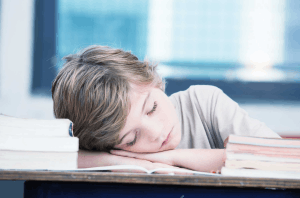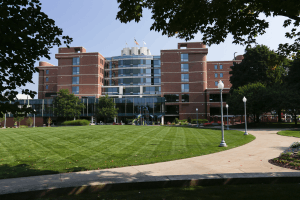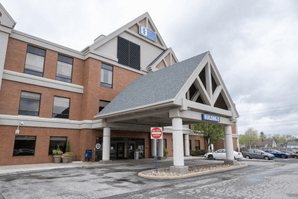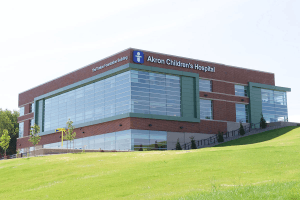Pediatric Sleep Medicine

Sleep disorders are more common in children who are obese or who have craniofacial problems, neurological problems or developmental delays. These include enlarged tonsils or adenoids, malformation in the face, and conditions such as Down syndrome or spina bifida.
Learn more...Department: 330-543-8885
About Sleep Medicine
Symptoms of sleep disorders.
If you answer yes to three or more of the below symptoms, particularly the first four, your child or teen should be evaluated for a sleep disorder.
Does your child
- Snore loudly, snore often or have trouble breathing while sleeping.
- Feel very sleepy during the day or fall asleep at inappropriate times.
- Have trouble falling or staying asleep.
- Experience restless sleep or move their legs a lot while sleeping.
- Wake up tired, even after a full night of sleep.
- Wake up with a headache.
- Have frequent upper airway infections.
- Have a short temper or act irritable.
- Act restless or have difficulty concentrating or remembering.
- Have difficulty gaining weight or is overweight.
- Perform poorly in school.
- Have behavioral problems or learning disabilities.
- Have high blood pressure.
- Sweat while sleeping.
- Sleep in unusual positions.
- Wet the bed.
We recommend that you keep a daily sleep diary for a week or two. Write down the time your child takes naps, goes to bed, the time he wakes up, and anything that seems to affect his sleep. Share this information with her doctor and our staff.
Sleep Medicine, Akron
Akron Children's Pediatric Sleep Medicine, AkronConsidine Professional Building
215 West Bowery Street
Level 6
Akron, Ohio 44308
Fax: 330-543-8890
Map & directions
More about this location...
Hours
Appointments: 330-543-8885
Sleep Lab, Akron
Akron Children's Pediatric Sleep Lab, AkronMain Hospital Building
214 West Bowery Street
2nd floor - Yellow Elevator
Akron, Ohio 44308
Fax: 330-543-8890
Map & directions
More about this location...
Hours
Appointments: 330-543-8885
Sleep Medicine, Boardman
Akron Children's Sleep Medicine, BoardmanLeonard J. Fisher Family Building
6505 Market Street, Building A
Boardman, Ohio 44512
Fax: 330-729-1144
Map & directions
More about this location...
Hours
Appointments: 330-543-8885
Department: 330-729-3900
Sleep Lab, Boardman
Akron Children's Sleep Lab, BoardmanBuilding D
6505 Market Street
Boardman, Ohio 44512
Fax: 330-543-8890
Map & directions
More about this location...
Hours
Appointments: 330-543-8885
Department: 330-729-3900
Sleep Medicine, North Canton
Akron Children's Pediatric Sleep Medicine, North Canton6076 Whipple Avenue Northwest
North Canton, Ohio 44720
Map & directions
More about this location...
Hours
Appointments: 330-543-8885
Swaroop Pinto, MD
Director, Pediatric Sleep Medicine; Director, Sleep Labs; Pediatric Sleep Medicine Physician
- Teen sleep: What you need to know
- Help your teen recharge with sleep
- For teens: 5 Ideas for Better Sleep
- For kids: What Are Adenoids?
- For parents: Adenoids and Adenoidectomy
- For teens: Adenoids and Adenoidectomy
- For kids: ¿Qué son las adenoides?
- For parents: Adenoides y adenoidectomías
- For teens: Adenoides y adenoidectomías
- For parents: Kids and Sleep
- For parents: Obstructive Sleep Apnea
- For parents: Sleep and Your Teen
- For parents: Sleep and Your Preschooler
- For parents: Sleepwalking
- For kids: Sleepwalking
- Sleep Study Instructions – Akron
- Sleep Study Instructions – Boardman
- Instrucciones para la polisomnografía
- Instrucciones para padres relativas al estudio de latencia multiple del sueño
- Multiple Sleep Latency Test (MSLT) Instructions
- Sleep Center History and Physical and Order Form
- Sleep History Questionnaire
- Sleep Study Log (English)
Akron Children’s Hospital Sleep Center
PATIENT INSTRUCTIONS FOR A POLYSOMNOGRAM (PSG/SLEEP STUDY)
Parking Instructions and Directions
All patients will go to Admitting on the 3rd floor in the main hospital, before going to the Sleep Lab. Park in the Bowery Street parking deck, P1 (199 West Bowery Street, Akron OH 44308), enter the Considine building on level 3 and take the 2nd bridge to the Main Hospital. Admitting will be on your right past the ball machine and yellow elevators.
The Considine Building main doors lock at 8:00 p.m. If you are being dropped off, you can enter the hospital through the Bowery Street parking deck (P1) and follow instructions above. Information Desks are available until 9:00 p.m. to assist you. Please arrive before 9:00 p.m. If you arrive after 9:00 p.m. the doors to the Considine Building will be locked and you will need to park in the Exchange Street Parking deck and enter through the Kay Jewelers Pavilion P2 (348 Locust Street, Akron OH 44302).
What to do at home before the sleep study
- Complete the 2-week sleep log and patient questionnaire and bring with you to the sleep study.
- Keep normal sleep routines including naps (infants and toddlers).
- No food or drinks containing caffeine 24 hours before sleep testing (coffee, tea, chocolate).
- Eat your dinner before coming to the sleep lab.
- Bathe and cleanse hair without using conditioner.
- Do not use lotion, oils, hairspray, gel or makeup.
- No braids or ponytails are allowed.
What to bring to the sleep lab
- Bring all bedtime medications to give to your child at night and necessary supplies.
- Bring any breathing aids (PAP mask and tubing, vent/trach supplies).
- Bring or wear 2-piece comfortable pajamas. (No one piece pajamas or onesies)
- Bring a light snack and caffeine free drink.
- Bring favorite blanket, pillow, or toy.
Sleep study rules
- Only ONE parent or legal guardian is allowed to stay in the patient room. It is required for the parent to stay the entire night and care for your child for all patients under the age of 18 years old. You are not allowed to leave the sleep lab for any reason during testing.
- No siblings are allowed.
- No cell phone use will be allowed in the sleep testing room once lights are off.
After sleep study
- Unless your child is scheduled for daytime testing, you will be able to leave from the sleep lab between 6:00-6:30 am and it will be necessary to leave the patient room at that time.
- Sleep study results will be sent to the ordering physician within 10 business days.
Contact Information
- Questions, cancel or reschedule call: 330-543-4485 or 1800-262-0333 ext 34485, during Monday-Friday 8-4:30.
- After hours: Sleep lab- 330-543-3390 or contact the Hospital Operator at 330-543-1000 and ask for Sleep Lab
You can also visit us on the web at https://www.akronchildrens.org/sleepcenter
Specialized care.
Akron Children's Sleep Center is fully accredited by the American Academy of Sleep Medicine (AASM). Accreditation from the AASM is voluntary and reflects our commitment to providing the highest quality care for sleep disorders.
We have specific expertise in diagnosing and treating children and teens who suffer from severe sleep disruptions. We bring together a team of pediatric neurologists, pulmonologists, developmental and behavioral pediatricians, ENT specialists and others to help children and families cope with, and often eliminate, severe sleep disruptions. Chronic lack of sleep may affect a person’s health, job or school performance, memory, mood and behavior. And if children and teens don’t get enough sleep, the entire family may be affected by disrupted sleep.
We may recommend a sleep study if your child's sleep problems last longer than a few weeks and interferes with daily function and wellbeing.
Programs and Clinics
- Specialty Programs:
- Sleep Study
- Behavioral Sleep Medicine
Conditions and Treatments:
Sleep disorders, insomnia, restless legs, sleep apnea, sleep walking, sleep terrors

























